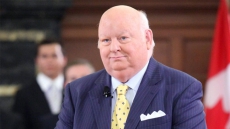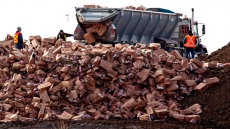VANCOUVER - The second day of a court hearing gets underway today in Vancouver over a request from the United States to extradite an executive of the Chinese telecom giant Huawei on fraud charges.
The hearing began yesterday with Meng Wanzhou's lawyer arguing the fraud charges are a "facade."
Richard Peck told a British Columbia Supreme Court judge the charges filed by the U.S. are really about the country trying to enforce its sanctions on Iran.
Meng's case fractured Canada-China relations after Beijing detained two Canadians and restricted imports in moves widely seen as retaliation for her arrest in 2018.
At issue in this week's hearing is the legal test of double criminality, meaning that if her alleged conduct is a crime in Canada then Meng should be extradited to face the charges in the U.S.
Meng is accused of lying to HSBC about Huawei's relationship with an Iran-based subsidiary, putting the bank at risk of violating U.S. sanctions against the country.
However, her lawyer argued the allegations do not amount to fraud and Canada has expressly refused to impose similar sanctions against Iran.
Lawyers for Canada's attorney general, on behalf of the U.S., have argued in court documents that Meng's alleged misrepresentations put HSBC at risk of economic loss and are sufficient to make a case of fraud in Canada.
The U.S. alleges that Huawei controlled the operations of its affiliate Skycom in Iran from at least 2007 to 2014, but Meng met with a senior HSBC executive in 2013 and made assurances that Huawei no longer held a shareholding interest in Skycom.
HSBC and its U.S. subsidiary cleared more than US$100 million worth of transactions related to Skycom through the U.S. between 2010 and 2014, exposing the bank to civil and criminal liability, American officials allege.
If the judge decides the legal test of double criminality has not been met, Meng will be free to leave Canada, though she'll still have to stay out of the United States to avoid the charges.
If the judge finds there is double criminality, the hearing will proceed to a second phase.
That phase, scheduled for June, will consider defence allegations that Meng's rights were violated during her arrest in December 2018 at Vancouver's airport.




